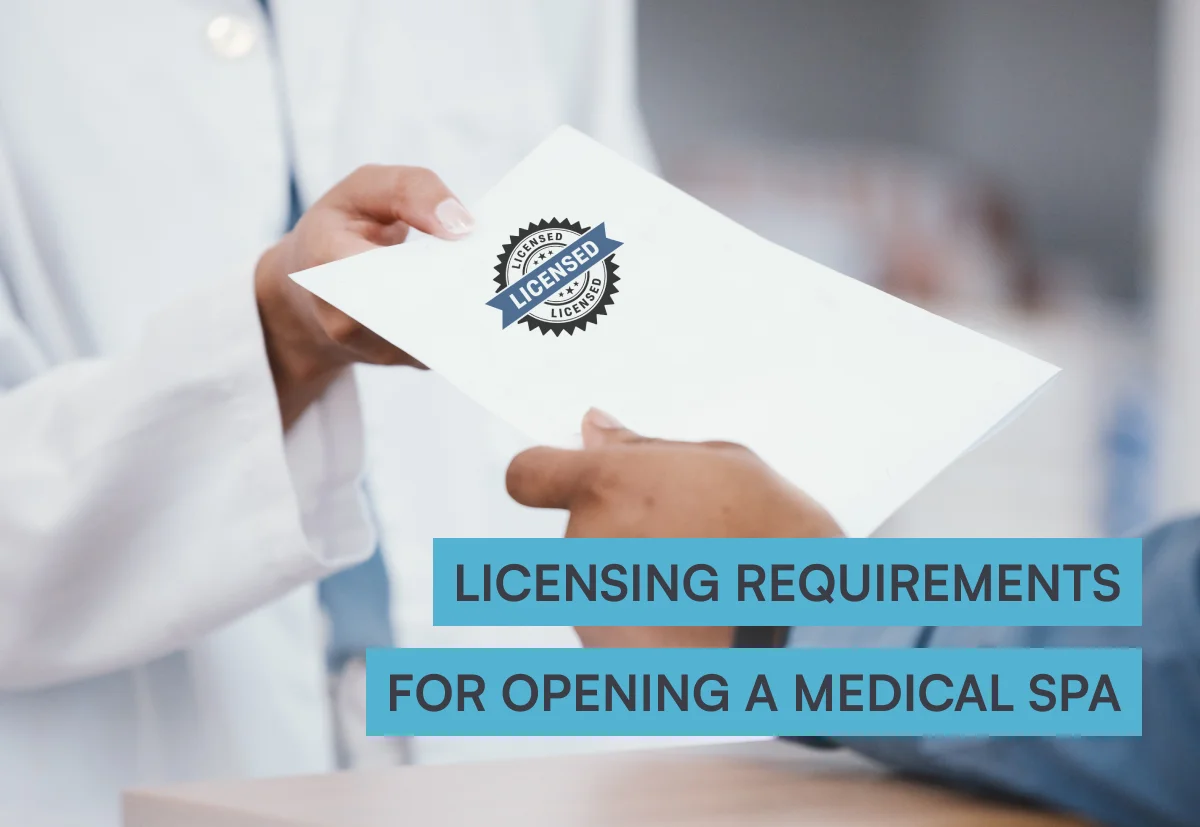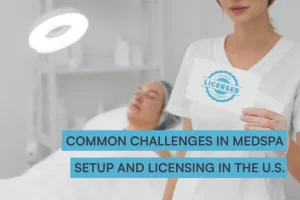Opening a medical spa means navigating a l-o-t of paperwork. And not just any paperwork – the worst kind of paperwork. Licenses, insurance, permits, the list goes on.
It’s never exactly going to be fun, but with a well-organized checklist, the entire process can be much less painful.
So, if you’re considering starting a med spa business, the first thing you need to familiarize yourself with is the common challenges in medspa setup and the licensing requirements you need to meet.
And let’s be clear about just how serious the repercussions are here. Even without some of these documents, your best hope is to sustain a $50,000-$100,000 fine. But, the worst case scenario would be suspension of your medical license or even forced closure of your business.
That’s why, in this blog, we unpack every license you need for the smooth operation of your med spa, helping you understand their importance and purpose along with why they’re so critical to your business.
General licensing requirements for a med spa
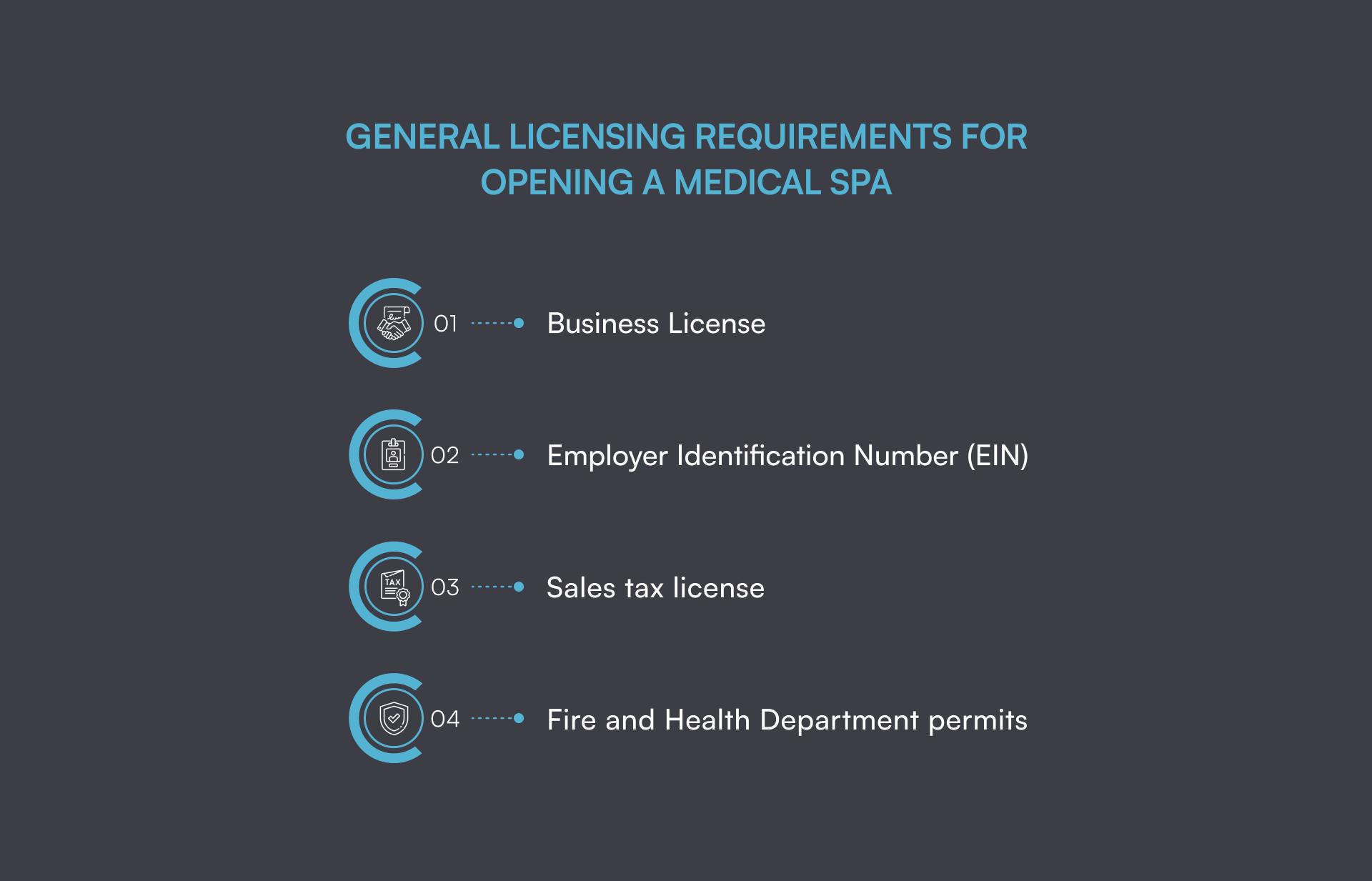
Licensing requirements are in place to regulate your business operations and ensure public safety.
Throughout the life cycle of your medical spa business, it’s crucial to meet various legal requirements at all government levels — local, state, and federal. These include taxes, employment requirements, business registration, as well as permits and licenses.
Additionally, proper licensing can maintain a positive reputation and facilitate business growth.
Business license
To operate a medical aesthetics business, business owners must obtain a general business license. This is a requirement for all big and small businesses so they can legally operate.
This license ensures adherence to local regulations. It covers fundamental aspects of business operations, such as taxation and zoning requirements, depending on the licensing requirements specific to the state where you intend to open your medical practice.
There is an exception, though. If your business plan is to run your med spa as an LLC (limited liability company) or corporation, you might not need a business license right away, as these organizations primarily offer liability protection for their members.
Nonetheless, this is not a permanent solution, and you will likely still need to obtain the necessary licenses and permits to operate legally.
Employer Identification Number (EIN)
The EIN is like a social security number, but only for business.
It’s a unique nine-digit number that is given to a business organization and all med spa owners must obtain it before they can launch their business. This number allows the IRS (Internal Revenue Service) to identify companies for tax reporting purposes.
But that’s not the only purpose of the EIN. It also allows businesses to open bank accounts and apply for credit.
Sales tax license
A sales tax license, also known as a sales tax permit or a seller’s permit, is an important document that allows a business to handle taxable retail sales and collect sales tax from its clients.
For instance, if your medical spa sells products like skincare items, a state sales tax permit is required.
In states where sales tax applies, businesses must get a sales tax permit before collecting and sending in sales tax money. Otherwise, you might face а $100,000 fine or even imprisonment up to 10 years, depending on the state your med spa is located.
Each state has its own agency and process so, to apply for a sales tax permit, it’s crucial to find out which one in your state to contact.
Fire and Health Department permits
Fire and Health Department permits are essential certifications that businesses must obtain to ensure compliance with fire safety and health regulations. These permits signify that a business has met the standards and requirements set by the local fire and health department.
Fire department permits typically involve inspections of the premises to assess fire safety measures, such as fire alarms, sprinkler systems, and emergency exits.
Health department permits focus on ensuring that businesses adhere to hygiene and sanitation standards. For instance, in Florida, the Department of Health conducts inspections for medical spa businesses.
Medical and professional licensing requirements for a med spa
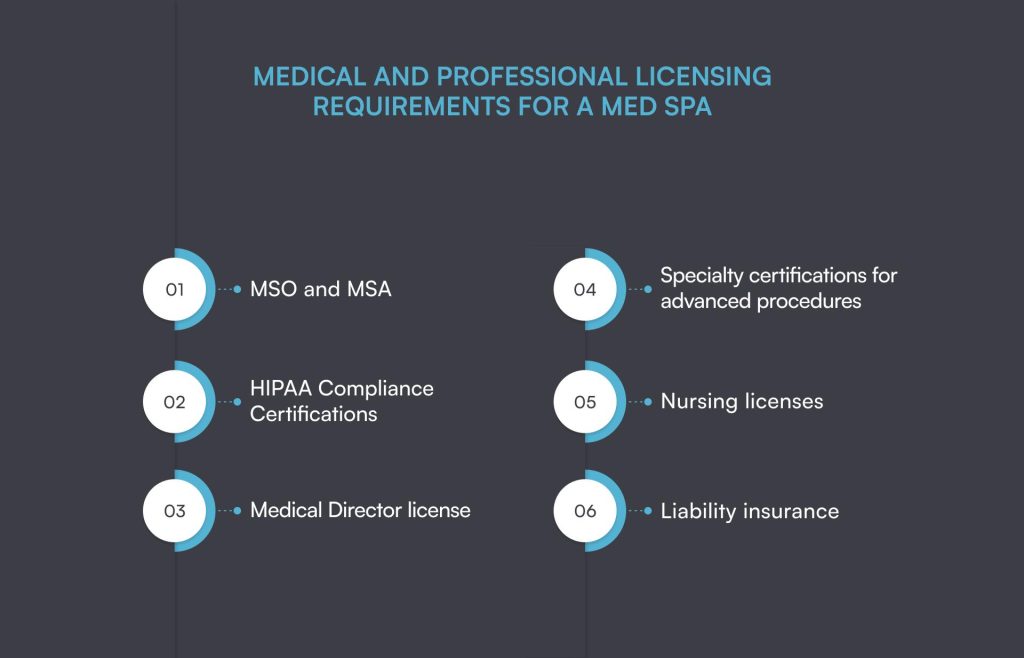
Medical spas, due to the sensitive nature of the services and aesthetic treatments they provide, must also possess medical and professional licenses. These licenses serve to protect your business, patients, and your staff.
Ensuring compliance with licensing requirements not only upholds regulatory standards but also demonstrates your commitment to maintaining the highest level of safety, professionalism, and quality of care within your med spa, which is a great signal to customers, too.
MSO and MSA
An MSO (Management Services Organization) is a legal entity that provides non-medical administrative and management services to medical spas. This organization helps medical spas navigate the complexities of healthcare laws and works closely with a physician to ensure that the day-to-day operations meet state medical standards.
In simple terms, this means this means an MSO takes care of the business side of running a medical spa, handling tasks like staff management, compliance with regulations, and administrative duties.
It’s important to note that licensed physicians are not obligated to collaborate with an MSO, only if they want to.
However, in some states, non-physicians aren’t allowed to own or operate a medical service business and they must sign an MSA (Managed Service Agreement) with an MSO so they can run their business.
Read this detailed guide to better understand the role of MSOs for medical spas.
HIPAA Compliance Certifications
HIPAA, the Health Insurance Portability and Accountability Act of 1996, is a federal law designed to safeguard sensitive patient health information. It strictly prohibits the disclosure of any patient information without the patient’s explicit consent or knowledge.
Compliance with HIPAA is mandatory for all businesses in the US. involved in healthcare treatment, operations, and payment, as well as business associates like software vendor who have access to patient information and provide healthcare support.
Medical Director license
A medical spa typically requires a licensed physician to oversee medical procedures. This person, known as the medical director, must have a valid medical license in the state where the spa operates. For instance, in California, this would be a license from the California Medical Board.
The medical director assumes the responsibility of overseeing and delegating medical treatments within their scope of practice, ensuring adherence to professional standards and regulatory guidelines.
Specialty certifications for advanced procedures
These certifications are typically obtained by healthcare professionals such as physicians, nurse practitioners, physician assistants, estheticians, or aestheticians who specialize in specific advanced treatments or cosmetic procedures offered at the spa.
Such certifications may include laser treatment certifications for laser hair removal, certification for injectables (such as for anti-wrinkle treatment or dermal fillers), or certifications for advanced skincare techniques.
By getting these special certifications, professionals show they are skilled and committed to learning specific procedures. This assures clients that they’re getting treatments from qualified experts with special training. And in the competitive med spa industry, it’s crucial for staff to consistently acquire certifications in new treatment because it will set your med spa apart from competitors.
By obtaining these specialty certifications, professionals demonstrate their competency and dedication to mastering specialized procedures, providing clients with the assurance of receiving treatments from qualified practitioners with specialized training and expertise.
Nursing licenses
Nurses (both Registered Nurses (RN) and Licensed Practical Nurses (LPN)) have a huge impact on public and health safety and that’s why they must have a nursing license. These licenses ensure that nurses possess the essential knowledge and skills to practice safely while upholding ethical standards.
While the specific requirements and application processes vary among state nursing boards, certain core elements remain consistent across states.
To become licensed, nurses must
- Graduate from an accredited nursing school
- Successfully pass the NCLEX-RN examination
- Complete an application along with a background check
For more advanced procedures, such as administering injections, nurses are required to obtain an APRN license.
In most states, for nurses to get this license, they need to pass a national certification exam after completing their masters degree.
On the other hand, if you’re a nurse looking to open a med spa in California, there are additional requirements beyond just these licenses.
Liability insurance
Another thing medical professionals need to obtain is liability insurance.
Liability insurance will safeguard them against potential legal claims that may arise from the spa services they provide. It serves as a protective measure, offering financial coverage and legal advice in the event of lawsuits or claims alleging negligence, errors, or omissions.
And it’s wise to have it in place as, 31% of physicians had been sued in their careers.
Having liability insurance provides nurses and practitioners with peace of mind and financial security, allowing them to focus on delivering high-quality services to their patients without the fear of significant legal costs or damages.
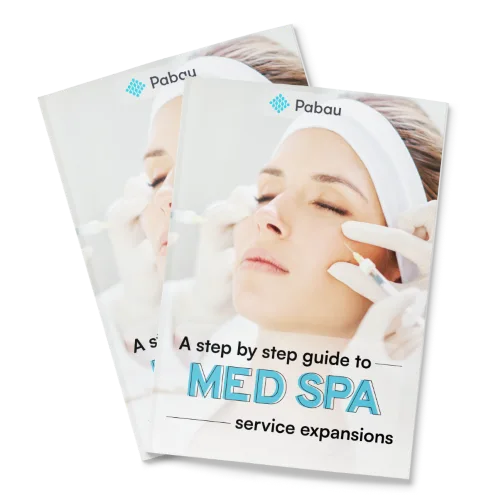
Looking to open a med spa? Find out how Pabau can help
You can check out the 15 top Pabau competitors and alternatives in 2023 here.
Running a med spa comes with complexities, that’s just a fact. That’s why, if you come across a tool or a system that can simplify your business, you should grab it with both hands.
That’s where we come in.
Pabau is an all-in-one practice management software solution that will help you keep an eye on all the operations and activities going on in your med spa and help you with all the licensing requirements.
Pabau will let you:
- Keep detailed digital client records safe and secure in the system, including EMR, photos, lab tests, and more
- Create and send intake forms at the time of booking, and check they’re complete before appointments
- Create staff profiles and assign them services they’re allowed to perform, which makes it easier for clients who want to book appointments online
Plus, Pabau’s security features will keep all your patient information safe and sound. This is critical, and here’s why…
An analysis of data breaches between 2015 and 2022 showed that 32% of the recorded attacks were in the healthcare sector — almost double the number in the manufacturing and financial sectors. It’s not worth the risk.
Find out more about Pabau’s exceptional features.

